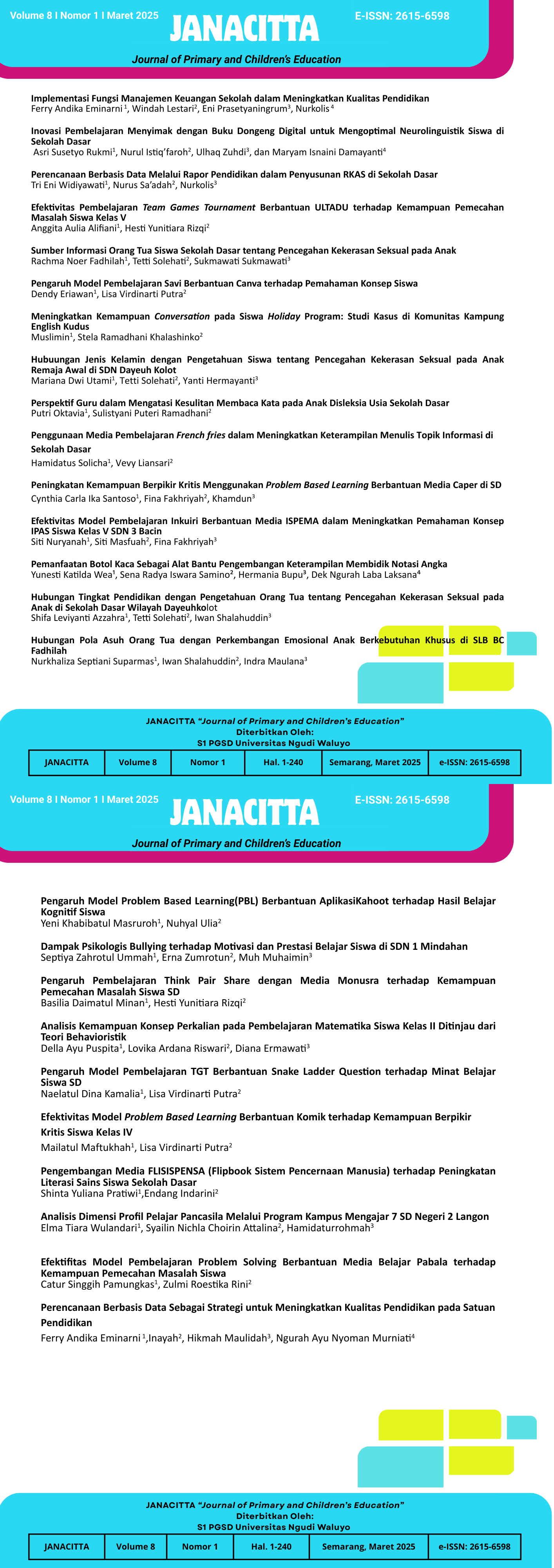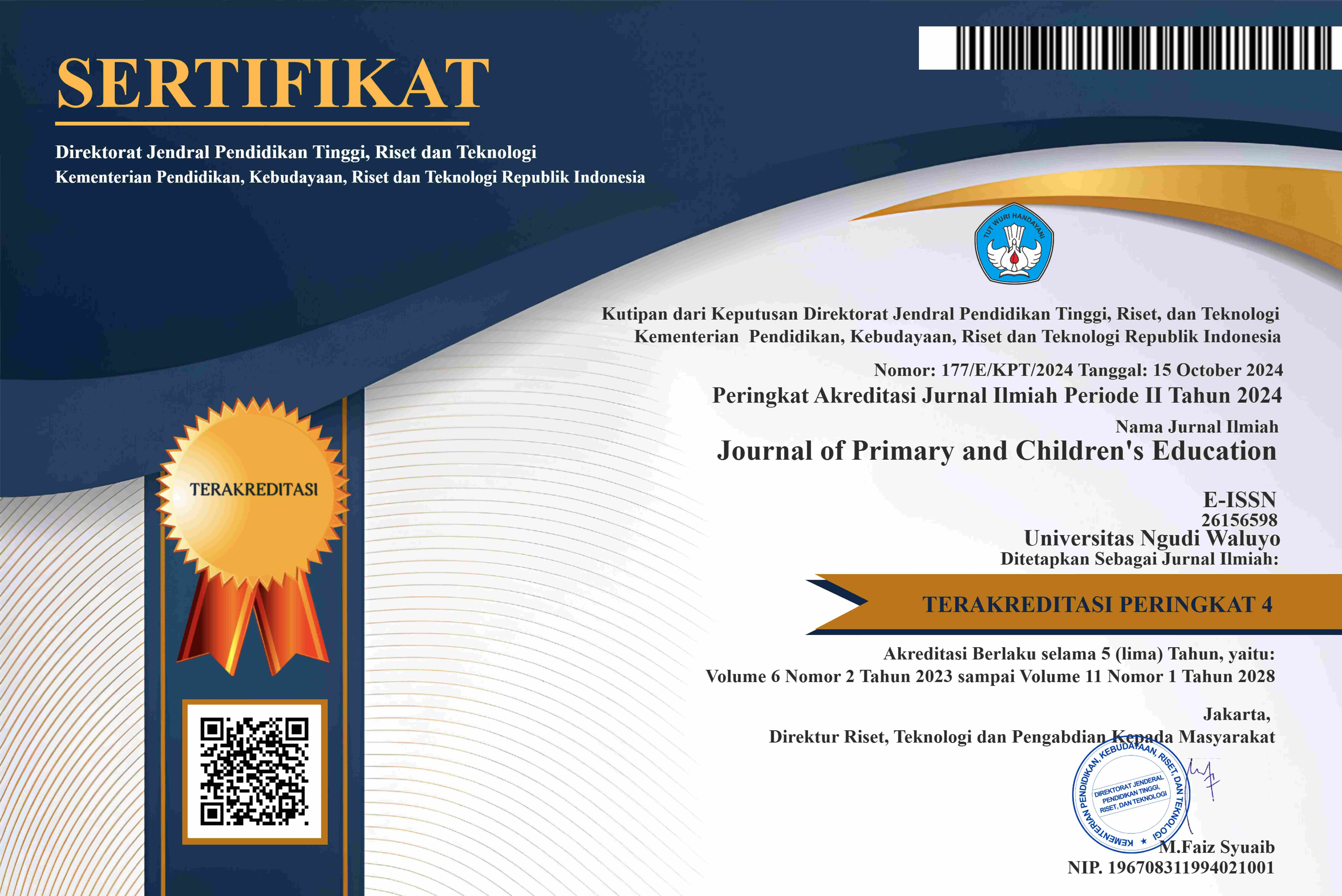Sumber Informasi Orang Tua Siswa Sekolah Dasar tentang Pencegahan Kekerasan Seksual pada Anak
DOI:
https://doi.org/10.35473/janacitta.v8i1.3724Abstract
Abstract
Child sexual abuse (CSA) in Indonesia remains a serious issue, with the number of cases continuing to rise. One of the causes of CSA is the lack of exposure to information among parents, compounded by the perception that the topic is taboo. Parents need to obtain adequate information to educate their children about preventing CSA. Information can be accessed from various sources, such as individuals, conventional media, and social media. This study aims to identify the sources of information about CSA prevention that parents utilize. The research was conducted in October 2024 using a descriptive quantitative research design with a sample of 100 parents of students in grades 1–6 at elementary schools in the Dayeuhkolot subdistrict, Bandung Regency. The sampling technique employed was stratified random sampling. The instrument used was a questionnaire developed by Solehati, (2022) titled "Prevention of Sexual Violence in Elementary School-Aged Children Involving the Role of Parents and Teachers in West Java," which includes demographic data and information sources. Data collection was conducted through Google Forms. Data analysis consisted of frequency distribution and percentages of the information sources used by parents, presented in graphical form. The results showed that almost all respondents (88%) used social media as a source of information about CSA prevention. To develop CSA prevention programs, healthcare workers and teachers are advised to incorporate the use of social media to enhance CSA prevention efforts among parents.
Abstrak
Kekerasan seksual pada anak (KSA) di Indonesia saat ini masih menjadi masalah serius dengan jumlah kasus yang terus meningkat. Salah satu penyebab terjadinya KSA karena orang tua kurang terpapar informasi disertai adanya anggapan tabu. Orang tua harus mendapatkan informasi yang memadai agar dapat memberikan edukasi tentang pencegahan KSA. Informasi dapat diakses dari berbagai sumber seperti manusia, media konvensional, dan media sosial. Penelitian ini bertujuan untuk mengidentifikasi sumber informasi pencegahan KSA yang didapatkan orang tua. Penelitian ini dilakukan pada bulan Oktober 2024 menggunakan desain penelitian deskriptif kuantitatif dengan sampel orang tua siswa kelas 1-6 berjumlah 92 orang di Sekolah Dasar wilayah Dayeuhkolot Kabupaten Bandung. Teknik pengambilan sampel menggunakan stratified random sampling. Instrumen menggunakan kuesioner yang dibuat oleh Solehati, (2022) tentang “Pencegahan Kekerasan Seksual pada Anak Usia Sekolah Dasar dengan Melibatkan Peran Orang tua dan Guru Sekolah di Jawa Barat” yang berisi data demografi serta sumber informasi. Teknik pengumpulan data melalui Google Form. Analisis data berupa distribusi frekuensi dan persentase sumber informasi orang tua yang disajikan dalam bentuk grafik. Hasil penelitian menunjukkan hampir seluruh responden (88%) menggunakan media sosial sebagai sumber informasi tentang pencegahan KSA. Untuk mengembangkan program pencegahan KSA petugas kesehatan dan guru disarankan melibatkan penggunaan media sosial dalam meningkatkan upaya pencegahan KSA pada orang tua.
References
Ahmad, A., & Nurhidaya. (2020). Media Sosial dan Tantangan Masa Depan Generasi Milenial. Avant Garde: Jurnal Ilmu Komunikasi, 8(2), 134. https://doi.org/10.36080/ag.v8i2.1158
Aiffah, G. I., & Religia, W. A. (2020). Child Sexual Abuse Prevention Program : Reference to The Indonesian Government. Jurnal Promkes: The Indonesian Journal of Health Promotion and Health Education, 8(2), 238–252. https://doi.org/10.20473/jpk.V8.I2.2020.238-252
Al Farouqi, N., Novelasari, N., Widdefrita, W., Sidiq, R., & Maria Lestari Silaban, E. (2023). Program “Aku Sayang Diri” terhadap Peningkatan Keterampilan Guru TK dalam Pendidikan Seksual Anak Usia Dini. Jurnal Ilmiah Manusia dan Kesehatan, 6(2), 273–280. https://doi.org/10.31850/makes.v6i2.2213
Bryan, M. A., Evans, Y., Morishita, C., Midamba, N., & Moreno, M. (2020). Parental Perceptions of the Internet and Social Media as a Source of Pediatric Health Information. Academic Pediatrics, 20(1), 31–38. https://doi.org/10.1016/j.acap.2019.09.009
Christin, M., Yudhaswara, R. K., & Hidayat, D. (2021). Deskripsi Pengalaman Perilaku Selektif Memilih Informasi di Masa Pandemi Covid-19 pada Media Massa Televisi. Jurnal Penelitian Komunikasi dan Opini Publik, 25(1), 61–73.
Dewi, V. N. L., Sitaresmi, M. N., & Dewi, F. S. T. (2021). What Forms of Media Do We Need for Preventing Child Sexual Abuse ? A Qualitative Study in Yogyakarta Special Region, Indonesia. Journal of Child Sexual Abuse, 30(5), 511–523. https://doi.org/10.1080/10538712.2021.1898510
Ferragut, M., Rueda, P., Cerezo, M. V., & Ortiz-tallo, M. (2020). What Do We Know About Child Sexual Abuse? Myths and Truths in Spain. Journal of Interpersonal Violence, 1–19. https://doi.org/10.1177/0886260520918579
Fischer, V. J., Andersson, G., Billieux, J., & Vögele, C. (2021). A Randomized Controlled Trial of an Internet-based Emotion Regulation Intervention for Sexual Health: Study Protocol. Trials, 22(1), 1–11. https://doi.org/10.1186/s13063-021-05586-x
Foster, J. M. (2017). Engaging Parents and Caregivers in The Prevention of Child Sexual Abuse. Journal of Trauma & Treatment, 6(1), 1–2. https://doi.org/10.4172/2167-1222.1000367
Frey, E., Bonfiglioli, C., Brunner, M., & Frawley, J. (2022). Parents’ Use of Social Media as a Health Information Source for Their Children: A Scoping Review. Academic Pediatrics, 22(4), 526–539. https://doi.org/10.1016/j.acap.2021.12.006
Hasan, K., Utami, A., Eni, S., Izzah, N., & Cahya Ramadhan, S. (2023). Komunikasi di Era Digital: Analisis Media Konvensional Vs New Media pada Kalangan Mahasiswa Ilmu Komunikasi Universitas Malikussaleh Angkatan 2021. Jurnal Komunikasi Pemberdayaan, 2(1), 56–63. https://doi.org/10.47431/jkp.v2i1.302
Hasiana, I. (2020). Peran Orang Tua dalam Pendidikan Seksual Anak Usia Dini. Wahana, 72(2), 118–125. https://doi.org/10.36456/wahana.v72i2.2725
Hendrawati, S., Maryam, N. N. A., Rakhmawati, W., Abas, L. H., Fitria Amita, D., & Risminda, N. (2023). Pencegahan Kekerasan Seksual Anak Usia Sekolah (6-12 Tahun). Poltekita: Jurnal Pengabdian Masyarakat, 4(3), 886–896. https://doi.org/10.33860/pjpm.v4i3.1844
Ifroh, R. H., & Permana, L. (2022). Do Parents Use The Internet and Social Media To Child Health-Seeking Information? Jurnal Kesehatan Komunitas, 8(2), 171–180. https://doi.org/10.25311/keskom.vol8.iss2.1209
Ikhsan Akbar, M., & Nirwan, M. (2023). Literasi Media Sosial Sebagai Upaya Penanggulangan Hoax Informasi Kesehatan pada Masyarakat Pesisir di Desa Nii Tanasa Kecamatan Lalonggasumeeto Kabupaten Konawe. PARADIGMA Jurnal Pengabdian Masyarakat, 1(2), 70–76.
Indraswari, R., Shaluhiyah, Z., Widjanarko, B., & Suryoputro, A. (2021). Factors of Mothers’ Hesitation in Discussing Reproductive Health. International Journal of Public Health Science (IJPHS, 10(4), 801–806. https://doi.org/10.11591/ijphs.v10i4.21147
Kemendikbudristek. (2023). Modul Pembelajaran Pencegahan Kekerasan Seksual Jenjang SD. Pusat Penguatan Karakter. Jakarta: Kementerian Pendidikan, Kebudayaan, Riset, dan Teknologi
Kemenkeu. (2021). Generasi “Milenial” dan Generasi “Kolonial.” https://www.djkn.kemenkeu.go.id/kpknl-pontianak/baca-artikel/14262/Generasi-Milenial-Dan-Generasi-Kolonial.html#:~:text=Mereka sekarang berusia 8-23,(lahir 1946-1964).
KemenPPPA. (2024). Kolaborasi Berkelanjutan Lintas Sektor dan Regional, Kunci Atasi Kasus Kekerasan Seksual terhadap Anak. https://www.kemenpppa.go.id/page/view/NTAxNg==
KemenPPPA RI. (2019). Panduan Penanganan Kasus Anak Multidisiplin yang Berpusat pada Anak. https://www.kemenpppa.go.id/page/view/MjQ4NQ==
Komisi Perlindungan Anak Indonesia. (2018). KPAI: Pelecehan Seksual pada Anak Meningkat 100%. https://www.kpai.go.id/publikasi/kpai-pelecehan-seksual-pada-anak-meningkat-100
Kompas. (2024, September 13). Orang Indonesia Tonton Youtube Rata-rata 4 Jam Per Hari di Televisi Cerdas. https://www.kompas.id/baca/ekonomi/2024/09/13/rata-rata-warganet-menonton-konten-youtube-4-jam-per-hari
Ligina, N. L., Mardhiyah, A., & Nurhidayah, I. (2018). Peran Orang Tua dalam Pencegahan Kekerasan Seksual pada Anak Sekolah Dasar di Kota Bandung. Jurnal Keperawatan, 9(2), 109–118. http://ejournal.umm.ac.id/index.php/keperawatan/article/view/5454
Noviana, I. (2015). Kekerasan Seksual terhadap Anak: Dampak dan Penanganannya. Sosio Informa, 1(1), 13–28.
Nurmanita, T. S., & Anggraini, C. C. D. (2024). Peningkatan Pemahaman Guru terhadap Media Sosial dalam Pembelajaran. Janacitta, 7(2), 105–110. https://doi.org/https://doi.org/10.35473/jnctt.v7i2.3028
Parwati, L. D., Pramitaresthi, I. G. A., & Antari, G. A. A. (2021). Persepsi Orang Tua terhadap Pendidikan Seksual pada Remaja di Kecamatan Kuta Kabupaten Badung. Community of Publishing In Nursing (COPING), 9(4), 441–449. https://ojs.unud.ac.id/index.php/coping/article/download/62973/42926
Purniati, D., Samsu, & Iqbal, A. (2022). Pemanfaatan Media Televisi dalam Memenuhi Kebutuhan Informasi Masyarakat Desa Sungai Ruan Ilir Kabupaten Batang Hari. Journal of Religion and Film, 1(1), 19–36. https://doi.org/10.30631/jrf.v1i1.3
Rakhmawati, D., & Maulia, D. (2020). The Effect of Sexual Violence on Children. Proceedings of the 2nd International Seminar on Guidance and Counseling 2019 (ISGC 2019), 462(5), 311–314.
Rakhmawati, E., Maulia, D., Rakhmawati, D., & Yuliejantiningsih, Y. (2024). Pendampingan Guru Mengenai Kurikulum Anti Kekerasan Seksual Anak di Kota Semarang. Bhakti Nagori (Jurnal Pengabdian Kepada Masyarakat), 4(2), 57–66. https://doi.org/e-ISSN: 2807-6907
Rakhmawati, E., Yuliejatiningsih, Y., & Rakhmawati, D. (2024). Sexual Psychoeducation of Pre-School Children: Teachers’ Strategies and Barriers in Teaching Self-Protection. Bulletin of Counseling and Psychotherapy, 6(1), 1–12. https://doi.org/10.51214/00202406839000
Raspa, M., Lynch, M., Squiers, L., Gwaltney, A., Porter, K., Peay, H., Huston, A., Fitzek, B., & Boyle, J. G. (2020). Information and Emotional Support Needs of Families Whose Infant Was Diagnosed With SCID Through Newborn Screening. Frontiers in Immunology, 11(May), 1–10. https://doi.org/10.3389/fimmu.2020.00885
Rudolph, J., Zimmer-gembeck, M. J., Shanley, D. C., & Hawkins, R. (2017). Child Sexual Abuse Prevention Opportunities: Parenting, Programs, and The Reduction of Risk. Child Maltreatment, 1–11. https://doi.org/10.1177/1077559517729479
Rustiana, M. (2021). Analisis Peran Orang Tua dalam Mendampingi Pembelajaran Anak di Masa Pandemi Covid-19. Janacitta, 4(1), 14–17. https://doi.org/10.35473/jnctt.v4i1.965
Sabani, F. (2019). Perkembangan Anak-Anak Selama Masa Sekolah Dasar (6-7 tahun). Didaktika: Jurnal Kependidikan, 8(2), 89–100. https://doi.org/ISSN 230-1330
Setyastuti, Y., Suminar, J. R., Hadisiwi, P., & Zubair, F. (2019). Millennial Moms: Social Media as the Preferred Source of Information about Parenting in Indonesia. Library Philosophy and Practice. https://digitalcommons.unl.edu/libphilprac/2558/
Solehati, T. (2022). Pengembangan Mobile Application Pencegahan Kekerasan Seksual Anak Usia Sekolah Dasar dengan Melibatkan Peran Orang Tua dan Guru Sekolah di Jawa Barat [Padjadjaran University]. https://repository.unpad.ac.id/items/af9fe12c-3437-4e16-98e5-8ab22479c6f0
Solehati, T., Arisandi, T., Nugraha, R., Hartini, N., Tresnala, R., Azizah, O. N., Ariyannur, R., Muliahati, P., Ramdani, R. T., Hermayanti, Y., Kosasih, C. E., & Mediani, H. S. (2022). Kebutuhan Informasi Pencegahan Kekerasan Seksual pada Anak bagi Orang Tua di Indonesia: Scoping Review. Jurnal Obsesi : Jurnal Pendidikan Anak Usia Dini, 6(6), 5970–5981. https://doi.org/10.31004/obsesi.v6i6.2982
Solehati, T., Kharisma, P. A., Nurasifa, M., Handayani, W., Haryati, E. A., Nurazizah, S. A., Pertiwi, F. R. C., & Kosasih, C. E. (2023). Metode Pencegahan Kekerasan Seksual pada Anak Berbasis Orang Tua: Systematic Review. Jurnal Obsesi : Jurnal Pendidikan Anak Usia Dini, 7(4), 4128–4143. https://doi.org/10.31004/obsesi.v7i4.5139
Sukemi, S. (2020). Upaya Meningkatkan Kompetensi Guru dalam Mengelola Administrasi Kelas Melalui Supervisi Klinis pada Guru di SD Negeri Sendang 01 Tahun Pelajaran 2018. Janacitta, 3(024), 46–56. https://doi.org/10.35473/jnctt.v3i1.632
Tiwery, I. B. (2022). Edukasi Seksual Sebagai Upaya Pencegahan Kekerasan Seksual pada Anak: Literatur Review. Moluccas Health Journal, 4(1), 90–96.
Wahida, D., & Paramastri, I. (2020). Program “Jari Peri” untuk Meningkatkan Keterampilan dan Efikasi Mengajar Prevensi Kekerasan Seksual pada Anak (KSA). Journal of Psychological Perspective, 2(1), 41–54. https://doi.org/10.47679/jopp.021.0620004
Wahidin, & Pangesti, N. A. (2023). Sex Education Parenting Application in Improving Parents Knowledge about the Prevention of Sexual Violence among Children. Malaysian Journal of Medicine and Health Sciences, 19(6), 39–44. https://doi.org/10.47836/mjmhs19.5.7
Wismayanti, Y. F., Leary, P. O., Tilbury, C., & Tjoe, Y. (2021). The Problematization of Child Sexual Abuse in Policy and Law: The Indonesian Example. Child Abuse & Neglect, 118(105157), 1–10. https://doi.org/10.1016/j.chiabu.2021.105157 Zhang, W., & Yuan, Y. (2023). Knowledge, Attitudes, and Practices of Parents Toward Sexuality Education for Primary School Children in China. Frontiers in Psychology. https://doi.org/doi: 10.3389/fpsyg.2023.1096516
Downloads
Published
How to Cite
Issue
Section
License
Copyright notice:
- Authors retain copyright and grant the journal right of first publication with the work simultaneously licensed under Creative Commons Attribution License that allows others to share the work with an acknowledgement of the work's authorship and initial publication in this journal.
- Authors are able to enter into separate, additional contractual arrangements for the non-exclusive distribution of the journal's published version of the work (e.g., post it to an institutional repository or publish it in a book), with an acknowledgement of its initial publication in this journal.
- Authors are permitted and encouraged to post their work online (e.g., in institutional repositories or on their website) prior to and during the submission process, as it can lead to productive exchanges, as well as earlier and greater citation of published work (The Effect of Open Access)







